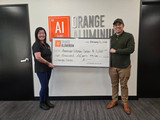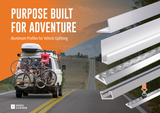Orange Cares Charities: Brain Injury Association of America

As a business, we believe you have to care about more than just exceptional products and customer service. It’s also essential to give back to the communities that support you.
That’s why we donate a portion of our sales to a different nonprofit organization every quarter.
For the second quarter of 2022, our team member Patrick Kozlowski nominated the Brain Injury Association of America (BIAA). It’s a cause that’s near and dear to our hearts—and we think it should be close to yours, too.
Why it Matters
Brain injuries are known as invisible disabilities. In many cases, there are no external signifiers. Because brain injuries are largely unseen, there’s little awareness around them.
And yet, brain injuries are surprisingly common. According to the National Library of Medicine, approximately 1.7 million Americans suffer from a traumatic brain injury (TBI).
For our team, that statistic became a reality in 2017, when Patrick’s mother suffered a traumatic TBI. He’s seen firsthand how brain injuries can impact the ones we love—and how charities like BIAA can help.
Brain Injury Basics
To help you understand the importance of the BIAA and their work around brain injuries, we’re shedding some light on the different types of trauma.
Acquired Brain Injuries
An acquired brain injury (ABI) is any injury to the brain that a person sustains after birth. It’s important to note that ABIs are different from hereditary or degenerative brain injuries that begin at birth.
While there are multiple types of ABI, they all affect the brain’s activity. Because the brain is the control center for the body, brain injuries can impact internal and external functions.
All acquired brain injuries fall under one of two categories: traumatic and non-traumatic.
Traumatic Brain Injuries
A traumatic brain injury (TBI) is the result of physical trauma. TBIs range from concussions to penetrations of the brain. They can be caused by events like:
- Car or motorcycle accidents
- Sporting injuries
- Workplace accidents
- Trips and falls
- Firearm-related injuries
- Assaults
In the past, experts dismissed smaller brain injuries like concussions as inconsequential. However, new research shows that even relatively minor TBIs can lead to issues later on.
Non-Traumatic Brain Injuries
A non-traumatic brain injury (NTBI) has nothing to do with a physical blow. Instead, NTBIs occur due to internal factors like exposure to neurotoxins or a lack of oxygen.
Scenarios that can cause an NTBI include:
- Brain tumors
- Aneurysms
- Near-drowning experiences
- Strokes
- Heart attacks
- Meningitis
Life With a Brain Injury
No matter how a brain injury occurs, it can mean a more challenging way of life for the person it affects. While the event that triggers an ABI may only last a second, it can lead to a lifetime of change. From physical symptoms like dizziness and muscle weakness—to cognitive issues like memory loss and trouble paying attention—brain injuries look different for everyone.
Those living with brain injuries often need additional resources. For example, someone who suffered a TBI may need:
- Therapy – Depending on the nature of the injury, a patient might need to work with a physical therapist, a speech-language pathologist, an occupational therapist or a traditional counselor.
- Mobility devices – Wheelchairs, walkers and canes can help those who need additional support.
- Home renovations – In some cases, a person’s home may need to be made more accessible.
As you can imagine, the costs of all these resources can add up. ABI patients may struggle to afford the necessary care—especially if they can no longer work.
But thanks to organizations like the BIAA, there’s hope. As Patrick tells us about his mother’s experience:
“The long journey that she’s been on and will continue to climb has shown me the body, mind, and heart’s resolve to recover and to survive. Through physical therapy, speech therapy, and emotional therapy, I’ve seen my mom adapt to her new way of life and maintain a beautiful perspective on what really matters at the end of the day.”
Orange Aluminum Cares
Patrick—and now, our entire staff—knows firsthand that “a charity like BIA USA helps bring awareness to those that fight, have fought, and will continue to climb their own mountains each and every day.” At Orange Aluminum, we’re proud to support nonprofits that have such a powerful impact on our communities.
During Q2 and beyond, we’ll continue to contribute to the BIAA and other worthy organizations that make a difference in the world. To learn more about our philanthropic work from past quarters, check out the other charities we’ve supported.
If you or someone you know has experienced a brain injury, don’t hesitate to contact the BIAA for more support.
Sources:
National Library of Medicine. Traumatic Brain Injury. https://www.ncbi.nlm.nih.gov/books/NBK459300/#:~:text
Brain Injury Association of America. What is the difference between an acquired brain injury and a traumatic brain injury? https://www.biausa.org/brain-injury/about-brain-injury/nbiic/what-is-the-difference-between-an-acquired-brain-injury-and-a-traumatic-brain-injury



